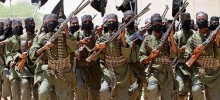Janice Simpson
How are Al-Qaeda and Daesh (now styling themselves the Islamic State of Iraq and Syria or ISIS) evolving and adapting to world changes? What draws people to these extremist groups and how do they differ? A panel of experts explored these complex questions at the Munk School of Global Affairs on December 16. Co-hosted by the University of Toronto Scarborough (UTSC), the talk was part of a series organized by the Munk School’s Islam and Global Affairs Initiative.
Renad Mansour, academy fellow at Chatham House in London and a research fellow at the Cambridge Security Initiative, led off with a warning to be wary of oversimplifications – such as assuming that all Sunnis have a common agenda or that ISIS and Al-Qaeda are unified organizations. There is internal conflict within these groups: “We have brother against brother and it’s decimating the social fabric in Iraq and Syria.”
Barak Mendelsohn, associate professor of political science at Haverford College, expanded on the theme of very diverse “franchises” within the Al-Qaeda and ISIS “brands”. In 2014, Daesh leader Abu Bakr Al-Baghdadi declared himself the caliph – the sole legitimate leader of the entire Muslim world (thereby disenfranchising Al-Qaeda) – and launched a sophisticated media machine. Other groups, like Boko Haram, determined it was in their strategic interest to declare themselves ISIS. Mendelsohn noted: “The ISIS approach has been if you say so, you’re one of us, though in reality there is little to no interaction and no coordinated plan of action.”
His view is that Al-Qaeda has become more politically savvy and changed its tactics since 9/11, embedding itself in regional movements and appealing to the broader Muslim community. Al-Qaeda is thoughtful about building alliances and careful about managing franchises, even “playing hard to get.” While fighting the west is in their DNA, they now look more like a network of affiliated organizations with specific local agendas. They see violence as a tool but not an end. In summary: “ISIS makes Al-Qaeda look polite and reasonable.”
Amarnath Amarasingam, fellow at the George Washington University’s Program on Extremism, studies people who fight in foreign wars. This is not a new phenomenon – think the Spanish Civil War – but what’s unique in Syria is the number of countries and individuals who have mobilized. There is no one profile of the hundred or so young Canadian men and women who have gone to Syria and Iraq on their own initiative to fight.
It’s now possible for researchers to connect with jihadists through social media to understand their motivations. (The moderator warned students that doing so outside of an approved research program could put them at risk of suspicion of jihadist leanings.) “Some early recruits were focused on what they saw as their religious obligation to protect their fellow Sunnis against the Assad regime,” said Amarasingam. “Later, others were drawn by portraits of the caliphate as the ideal Islamic state in which they would feel welcomed.”
While fighting continues in Mosul, most believe Daesh’s days there are numbered. Having failed to run a viable state, will they go underground and ramp up terrorist attacks? While the ISIS brand is attracting supporters now, will Al-Qaeda’s slower hearts-and-mind campaign prevail in the longer term? Will Assad be able to govern the Syria that very slowly rebuilds from the rubble? What happens to the millions of refugees? Mansour’s view that Turkey and Iran will emerge as the major powers in the Middle East became the subject of lively discussion. And how do Al-Qaeda and Daesh influence countries such as Yemen, Afghanistan, Somalia, Pakistan and Mali?
While extremism was the panel’s focus, Aisha Ahmad, assistant professor of political science and co-director of the Islam and Global Affairs Initiative, reminded the room to look beyond both groups in the discussion of Islam: “While we’ve focused this evening on extremist groups promoting terrorism and war, we must remember that the overwhelming majority of the world’s 1.5 billion Muslims are bewildered by these crazy radicals and share no values with them. In future events we’ll be exploring other aspects of the vibrant and diverse Islamic culture.”
December 20, 2016
